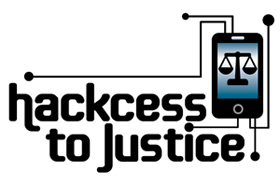'Hackcess to Justice' teams will devise new tech to improve access to justice

As the ABA Annual Meeting gets underway in Boston, teams of law students, lawyers, and computer programmers will be gathering at nearby Suffolk University Law School to help solve a problem that continues to vex many in the legal community: While advances in technology have helped increase the availability of legal advice to people who might not have had access, true access to the law in terms of knowing when a lawyer is needed and how to find the right legal representation remains low especially for the poor.
With this reasoning in mind, the ABA Journal is partnering with Suffolk Law to create the first-ever “Hackcess to Justice” legal hackathon, an event to brainstorm and devise ways to improve access to justice using technology.
The two-day hackathon will begin Thursday—with a keynote address from Jim Sandman, president of the Legal Services Corporation. Entrants will compete for $3,000 in prize money, with $1,500 going to the winner, $1,000 to second place and $500 for third. There will be a panel of three judges: LSC program counsel Glenn Rawdon, legal technology consultant K. Krasnow Waterman and lawyer and technology writer Robert Ambrogi. Ambrogi is a regular contributor to the ABA Journal.
According to Andrew Perlman, a law professor at Suffolk, the Journal approached him with the idea. “Over 80 percent of the civil legal needs of the poor go unmet because they can’t afford a lawyer or even know that they need one,” says Perlman, citing a 2013 LSC study, “Report of the Summit on the Use of Technology to Expand Access to Justice.” “We need to find ways to increase their access to the legal services they need because those needs are going unmet. Technology could be part of that solution.”
The LSC study called for each state to create a unified and automated legal portal to diagnose the legal needs of users and direct them to the right attorneys. The report also called for sophisticated document automation and the creation of expert systems to assist attorneys and legal services providers. Additionally, the report singled out mobile devices as a means to expand legal access among lower income individuals.
“Use of computers, tablets and, increasingly, smartphones is becoming the expected medium for accessing services of all kinds,” the report stated. “Eighty-six percent of adults earning less than $30,000 per year own cell phones, and 43 percent own smartphones.”
The report also promoted the use of legal hackathons to help stimulate creativity from the legal and technical spheres. Indeed, the LSC report provides the basis for the Hackcess to Justice, and entrants will be expected to create something that will address one or more of the goals articulated in the report.

“During one of the sessions [for creating the report], Todd Park, the U.S. Chief Technology Officer, talked about hackathons and how successful they had been in other areas, such as using technology to [serve] food deserts in low-income areas,” says Rawdon. “Once we heard about it, we immediately knew we needed to have a hackathon.”
Perlman adds that the idea of gathering great minds together for the purpose of solving a pressing problem greatly appealed to him. “Legal hackathons are becoming more popular because people in the legal industry are recognizing that technology is an important part of practicing the law today,” says Perlman.
Rawdon says he and the other judges will expect entrants to create programs or applications that would serve as expert systems and would be built for a mobile platform.
“One of the things we found to be lacking was self-assessment—helping a person determine if he or she needed an attorney,” says Rawdon. “We can build these systems rather than have people go to a lawyer’s office and be interviewed to determine if he or she needs representation.”
Another possibility involves coming up with ways to make the LSC’s content more accessible to the general public. Rawdon points out that LSC has many resources for veterans and people in need of representation as a result of a natural disaster.
“Maybe someone will have a better idea of how to take our content and make it more readable,” he muses. “Maybe it could look like the Flipboard app. We can give them ideas even if they haven’t come up with ideas so far.”
Last updated at 11 p.m. to change the headline.



